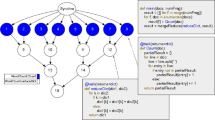Abstract
As data volumes grow rapidly, distributed computations are widely employed in data-centers to provide cheap and efficient methods to process large-scale parallel datasets. Various computation models have been proposed to improve the abstraction of distributed datasets and hide the details of parallelism. However, most of them follow the single-layer partitioning method, which limits developers to express a multi-level partitioning operation succinctly. To overcome the problem, we present the NDD (Nested Distributed Dataset) data model. It is a more compact and expressive extension of Spark RDD (Resilient Distributed Dataset), in order to remove the burden on developers to manually write the logic for multi-level partitioning cases. Base on the NDD model, we develop an open-source framework called Bigflow, which serves as an optimization layer over computation engines from most widely used processing frameworks. With the help of Bigflow, some advanced optimization techniques, which may only be applied by experienced programmers manually, are enabled automatically in a distributed data processing job. Currently, Bigflow is processing about 3 PB data volumes daily in the data-centers of Baidu. According to customer experience, it can significantly save code length and improve performance over the intuitive programming style.
Similar content being viewed by others
References
Dean J, Ghemawat S. MapReduce: Simplified data processing on large clusters. Communications of the ACM, 2008, 51(1): 107-113.
Zaharia M, Chowdhury M, Franklin M J, Shenker S, Stoica I. Spark: Cluster computing with working sets. In Proc. the 2nd USENIX Workshop on Hot Topics in Cloud Computing, June 2010, Article No. 5.
Zaharia M, Chowdhury M, Das T, Dave A, Ma J, McCauley M, Franklin M J, Shenker S, Stoica I. Resilient distributed datasets: A fault-tolerant abstraction for in-memory cluster computing. In Proc. the 9th USENIX Conference on Networked Systems Design and Implementation, April 2012, pp.15-28.
Chambers C, Raniwala A, Perry F, Adams S, Henry R R, Bradshaw R, Weizenbaum N. FlumeJava: Easy, efficient data-parallel pipelines. In Proc. the 2010 ACM SIGPLAN Conference on Programming Language Design and Implementation, June 2010, pp.363-375.
Meng X, Bradley J, Yavuz B et al. MLlib: Machine learning in Apache Spark. The Journal of Machine Learning Research, 2016, 17: Article No. 34.
Parsian M. Data Algorithms: Recipes for Scaling up with Hadoop and Spark. O’Reilly Media Inc., 2015.
Karau H, Warren R. High Performance Spark: Best Practices for Scaling and Optimizing Apache Spark (1st edition). O’Reilly Media Inc., 2017.
Akidau T, Bradshaw R, Chambers C et al. The dataflow model: A practical approach to balancing correctness, latency, and cost in massive-scale, unbounded, out-of-order data processing. Proceedings of the VLDB Endowment, 2015, 8(12): 1792-1803.
Isard M, Budiu M, Yu Y, Birrell A, Fetterly D. Dryad: Distributed data-parallel programs from sequential building blocks. ACM SIGOPS Operating Systems Review, 2007, 44(3): 59-72.
Saha B, Shah H, Seth S, Vijayaraghavan G, Murthy A, Curino C. Apache tez: A unifying framework for modeling and building data processing applications. In Proc. the 2015 ACM SIGMOD International Conference on Management of Data, May 2015, pp.1357-1369.
Gates A F, Natkovich O, Chopra S, Kamath P, Narayanamurthy S M, Olston C, Reed B, Srinivasan S, Srivastava U. Building a high-level dataflow system on top of Map-Reduce: The pig experience. Proceedings of the VLDB Endowment, 2009, 2(2):1414-1425.
Thusoo A, Sarma J S, Jain N, Shao Z, Chakka P, Anthony S, Liu H, Wyckoff P, Murthy R. Hive: A warehousing solution over a Map-Reduce framework. Proceedings of the VLDB Endowment, 2009, 2(2): 1626-1629.
Alexandrov A, Bergmann R, Ewen S et al. The stratosphere platform for big data analytics. The VLDB Journal, 2014, 23(6): 939-964.
Brown K J, Lee H, Rompf T, Sujeeth A K, de Sa C, Aberger C, Olukotun K. Have abstraction and eat performance, too: Optimized heterogeneous computing with parallel patterns. In Proc. the 2016 IEEE/ACM International Symposium on Code Generation and Optimization, March 2016, pp.194-205.
Power R, Li J. Piccolo: Building fast, distributed programs with partitioned tables. In Proc. the 9th USENIX Symposium on Operating Systems Design and Implementation, October 2010, pp.293-306.
Gunarathne T, Zhang B, Wu T L, Qiu J. Scalable parallel computing on clouds using Twister4Azure iterative MapReduce. Future Generation Computer Systems, 2013, 29(4): 1035-1048.
Caneill M, de Palma N. Lambda-blocks: Data processing with topologies of blocks. In Proc. the 2018 IEEE International Congress on Big Data, July 2018, pp.9-16.
Author information
Authors and Affiliations
Corresponding author
Electronic supplementary material
ESM 1
(PDF 81 kb)
Rights and permissions
About this article
Cite this article
Zhang, YC., Wang, XY., Wang, C. et al. Bigflow: A General Optimization Layer for Distributed Computing Frameworks. J. Comput. Sci. Technol. 35, 453–467 (2020). https://doi.org/10.1007/s11390-020-9702-3
Received:
Revised:
Published:
Issue Date:
DOI: https://doi.org/10.1007/s11390-020-9702-3




